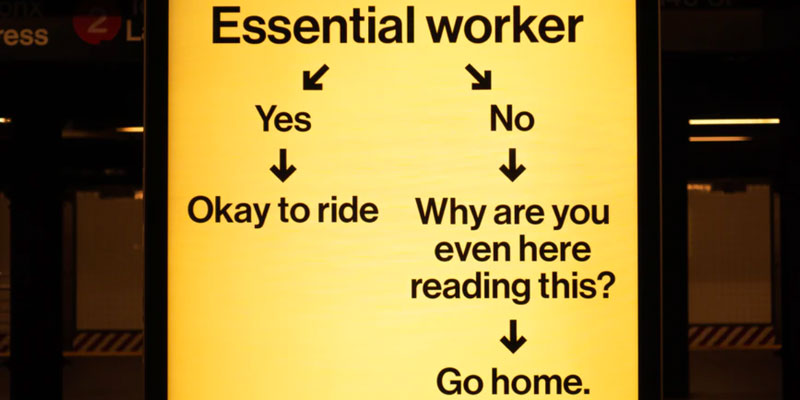You can’t help but be moved by stories like this. Similarly, you can’t miss the political reasons they aren’t more widely spread.
[Denisha] Merriweather’s future looked bleak. “Teachers would sigh when I walked through the door,” she said of the district schools she attended. “Another Merriweather,” they would judge. “My family name was not that bright,” she explained. The young child was on a familiar path of academic deficiency, hopelessness and missed opportunities that plagues many urban, low-income youths who are floundering in government-run schools. “Another Merriweather” was set to be a statistic.
But that’s not what happened. Merriweather went to live with her godmother who heard through her church community about a nearby private school. It was too expensive for her guardian to afford, but the family learned of Florida’s pioneering tax-credit scholarship program that expands education choice for income-eligible students looking to exit district schools.
The politics of this aren’t difficult to trace. The entire education establishment, from the administrative bureaucracy to the teachers unions, aligns with the Democrat Party, which is now fully built upon the premise that anything important should be run by government.
On the other side — whether you see it as cynical or as sincere — a foundational premise of economic freedom align with political incentives to make the Republican Party the party of school choice. That suite of policies most benefits the families that are the most stuck, which tends to mean those who are disadvantaged, among whom minorities are disproportionately numbered.
Yet, Democrats need minorities for votes and as political cover for their elitist policies, so evidence that school choice levels the playing field must be discounted or suppressed.
The gravity of this particular issue may be a central reason “anti-racism” and critical race theory are suddenly everywhere — with dogged support from teachers unions. Minorities must have their attention refocused on a “systemic racism” phantom that keeps them reliant on the very groups who are oppressing them.
In its broad strokes, this strategy is so obvious it’s difficult to imagine what could make people see it if they haven’t already.
Featured image by Redd on Unsplash.
[Open full post]Brad Polumbo conveys a should-be-unsurprising finding from an MIT study:
The federal government has spent an astounding $42,000 per federal taxpayer on so-called “stimulus” efforts since the pandemic began. Where did all that money go? Well, as it turns out, one of the biggest stimulus programs, the Paycheck Protection Program, failed miserably. …
The analysis shows that even though 93 percent of small businesses received loans from the program, only between 2-3 million jobs were preserved. The program spent an astounding $170,000-$257,000 for each job it helped preserve! That’s, erm, a lot more than most of those jobs even pay.
Moreover, the study finds that only 23 to 34 percent of the program’s dollars went to workers who would’ve otherwise lost their jobs—meaning the vast majority went to “business owners and shareholders.” (Oh, and a whole bunch was lost to fraud, too).
Some business owners got to take some nice vacations with the money, that’s for sure.
[Open full post]I’ll be honest. Facing a massive imminent bill for a prematurely failed septic system while I’m in the midst of a career adjustment and at a high-water mark for higher-education expenses spanning generations, news about a state-administered federal program to hand out up to $50,000 to homeowners initially felt like an opportunity:
The newly opened Homeowner Assistance Fund Rhode Island, or HAF-RI, was rolled out by Gov. Dan McKee’s office Monday morning. The $50 million available in Rhode Island is part of a $9.96 billion pot of federal funding included in the American Rescue Plan Act last March. …
Eligibility for HAF-RI depends on household income, with limits ranging from $90,850 for a one-person household to $171,300 for an eight-person household. To qualify, a homeowner must own and occupy a one- to four-unit dwelling in Rhode Island; have experienced a financial setback related to the pandemic since mid-January 2020; and have an original mortgage balance below $548,250.
Hand over some information and get a check. Nice and easy.
While homeowners are at it, they can get around mask shortages by calling up Uncle Bradon:
You can now get rapid COVID-19 tests delivered right to your door for free, but what about masks?
The Biden Administration plans to announce Wednesday that they will provide 400 million Americans with free N95 masks.
The masks are coming from the Strategic National Stockpile, which has more than 750 million of the highly protective masks on hand. They will start shipping by the end of next week and will be available at pharmacies and community health centers.
Free masks. Free tests. Free money.
Conservatives tend to respond to these stories by noting that nothing is free. Somebody is going to pay for all these handouts. But to me, the handouts themselves are starting to feel like a bigger problem — even if they were free. I kinda wanna feel like an adult, y’know? If I can’t make my situation work, maybe it would be better for me to have to take responsibility and make some big-boy decisions, about both the things I spend money on and the activities by which I try to provide value to others.
Maybe we shouldn’t make the temporary declaration that few of us are “essential” into a deep cultural theme.
From our perch in Rhode Island, this growing sense that maybe we shouldn’t want things to be free couples with daily reminders that government is failing massively at everything that is supposed to be its responsibility. Politicians are committing to debt on our behalf in order to give us handouts that deprive us of our responsibilities in order to distract us from the fact that they can’t live up to theirs.
Even if they somehow manage to avoid the economic ruin that common sense would predict from such a strategy, the cultural and psychological harm is going to rival that of the more-direct elements of our COVID response.
Featured image by Daniel Lee on Unsplash.
[Open full post]John DePetro speculates:
The real reason is an explosive story about to hit regarding Langevin under investigation regarding stock trading. Langevin would feel obligated to answer questions and face constituents if he was seeking another term in office or was indicted, but will ignore the press as the story leaks out.
Congress has seemed to become a place to get conspicuously wealthy. We should change that.
[Open full post]Democrat state representative from Warwick David Bennett continues his long streak of bad legislation with an effort to ban nips — those little bottles of alcohol that have been a fixture of liquor stores for decades:
Rep. David Bennett, D-Warwick, is tired of spotting discarded nips strewn along the side of the road whenever he walks his dog, or takes his grandson out in his stroller.
So he’s proposing that the General Assembly make it illegal to sell the miniature bottles of alcohol.
“It’s only supporting drinking and driving, and it’s causing a hell of a littering problem,” Bennett said in a Thursday interview. “There’s a ton of reasons to get rid of these things. What are they good for?”
That’s a certain type of legislator in a nutshell: I saw something I don’t like; ban it! Bennett doesn’t see it has is job to defend your rights; he thinks it’s your job to justify them against his desires.
The legislation is instructive for another reason. Once activists realize they only need to pressure a handful of politicians to simply ban things they find problematic, with great boosts of moral self-fulfillment, they’ll go in search of new problems that need banning. Plastic bags, plastic straws, nips. (If only they’d get around to banning mandates for disposable masks!)
“The thing we now hear from our members the most about, now that more than half of Rhode Islanders live in places with a plastic bag ban, is is these nip bottles,” said Johnathan Berard, Rhode Island director of Clean Water Action.
He, too, has been noticing more discarded nips during his runs along the Blackstone River in recent years.
“I feel like they’re becoming more ubiquitous,” Berard said. “That’s completely non-scientific — just my gut feeling.”
Your freedom is their problem. Bennett doesn’t drink. Berard is a runner. When their neighbors do things that they don’t care about and that cause them the slightest inconvenience, it’s easier to reduce their neighbors’ freedom than to find ways to live together. Kind of puts another chain on the progressive ideal of pressuring everybody into densely populated areas, doesn’t it?
Don’t miss the class distinctions, either. Progressives claim to be support low-income and working people, but by their policies shall you know them. Their policies tend to impose patronizing restrictions and costs on the unseemly Other for the benefit of the good and the beautiful. Anybody who buys the little bottles as a way of limiting their drinking, Bennett tells them to buy more. Are the nips attractive because the price is low? Well, now you’ll have to choose between this little pleasure and something else.
There was a time when a failure to keep the streets clean would have been seen as a deficiency of government, with calls for improvement. In Rhode Island, however, we don’t really expect government to accomplish anything well, even as we expect it to have its fingers into everything.
When did American government cease to be a service provider helping us accommodate each other and start being a tool for controlling every detail of others’ lives?
Featured image by Nipyata on Unsplash.
[Open full post]Libertarian columnist for the Washington Post Megan McCardle appeared on Russ Roberts’s EconTalk podcast to talk about the late Roger Scruton’s contrast of the Somewheres, whose worldview is deeply tied to a sense of belonging somewhere, and the Anywheres, who (if I may attempt to summarize their desire charitably) want to feel at home wherever they may go. For cultural shorthand, the Somewheres tend to be culturally conservative and working-to-middle class, while the Anywheres tend to be what we think of as the progressive elites.
I generally agree with both Roberts and McCardle, as well as with Scruton, on most things, but inside-the-Beltway McCardle made a comment toward the end that has been gnawing at me:
I don’t know that I’m worried about us having a Civil War, simply because my understanding from people who study this is that civil wars are mostly about having too many young men wandering around, and we are an aging country. Also, we have pretty good state capacity to control; I think it’s unlikely we’re going to, like, lose control of parts of Texas or something.
But, I think that the thing that animates that, the sense that the Anywheres have kind of already seceded from the country in some fundamental way and are formed their own little nation within a nation–I think is profoundly–and now fighting kind of a rhetorical civil war with the rest of the country–I think is profoundly disturbing.
And, I think that–you know, it’s not like the Somewheres haven’t reacted. I think the way the Somewheres have reacted to this is also profoundly, profoundly, profoundly disturbing. You know, the fact that we’re arguing about whether you should let elections proceed according to the procedures that were laid out in the election law, because Donald Trump is too big of an ego-maniac to admit he lost is just–that’s where we are. Of course, I worry about the future. How could you not worry about the future right now? This is crazy stuff that I thought we all agreed on–like, this is how elections happen–
You can see where McCardle’s social sympathies lie in the fact that one side’s actions are “profoundly disturbing,” while the other side gets multiple “profoundlys.” More significantly, though, you can see the narrative to which she subscribes by the way she allocates blame for the post-election atmosphere.
From the perspective of the Somewheres, the response to the election, including January 6, is most accurately characterized as their finally beginning to push back against the Anywheres by the rules that the Anywheres had established through their own actions. Arguably, the Somewheres’ adjustment to the new rules was mild when put in that context.
Fine, they were saying to themselves, if the Democrats can change election rules in extreme ways with minimal legal cover and less notice, then our people inside can do the same and use a pro forma technicality as if it is substantive. If progressives can riot for years and burn down cities, then we can get rowdy and march into the Capitol.
One can argue that was the wrong attitude intellectually, morally, and politically, but it’s profoundly unfair to present the Somewheres as having introduced something new and escalated. One gets the sense that many voices on the professional or intellectual right are of the opinion that the right can never adjust to new battlefield conditions or respond to the rules as they’re actually being practiced. That view is entirely appropriate when the rule of law enjoys controlling support, but when it does not, it’s simply an agreement to lose everything. (This, of course, does not mean anything goes.)
I’m not the first to observe that Donald Trump’s election should have been a signal to establishment conservatives that their base of supporters will abandon them before we abandon everything we hold dear. Back from her blogger days, McCardle has tended to be insightful along these lines, so it’s a bad sign that she misses the mark, this time.
Featured image by Nigel Tadyanehondo on Unsplash.
[Open full post]Late January and February can be tough, emotionally, in New England. Even when it’s sunny out, things look kind of dead, and biting cold can be painful rather than invigorating, which is to say, not very inviting.
Christian believers will often comfort those who feel down by assuring them that they are loved. As wonderful as that sounds, it can, in my experience, completely miss the problem. The problem is that the person doesn’t feel loved, so fine… if this is what being loved feels like, what’s the difference?
Think on this, instead: Your life is important because your experience of it is a relationship with God — or a relationship with the universe, if that’s easier to accept — and it is completely unique, and it is yours.
The question of what the other party to that relationship wants of you is a question you can work out over time, and if it helps, I’ll assure you that He wants what is best for you because He does love you. But step 1 is seeing life as a relationship because a relationship is alive with possibility and the need for definition, with an allowance for downs, but the promise of ups.
[Open full post]As expected as it probably should be, I have to say I’m still a bit surprised by these survey findings:
– Fifty-eight percent (58%) of voters would oppose a proposal for federal or state governments to fine Americans who choose not to get a COVID-19 vaccine. However, 55% of Democratic voters would support such a proposal, compared to just 19% of Republicans and 25% of unaffiliated voters.
– Fifty-nine percent (59%) of Democratic voters would favor a government policy requiring that citizens remain confined to their homes at all times, except for emergencies, if they refuse to get a COVID-19 vaccine. Such a proposal is opposed by 61% of all likely voters, including 79% of Republicans and 71% of unaffiliated voters.
– Nearly half (48%) of Democratic voters think federal and state governments should be able to fine or imprison individuals who publicly question the efficacy of the existing COVID-19 vaccines on social media, television, radio, or in online or digital publications. Only 27% of all voters – including just 14% of Republicans and 18% of unaffiliated voters – favor criminal punishment of vaccine critics.
– Forty-five percent (45%) of Democrats would favor governments requiring citizens to temporarily live in designated facilities or locations if they refuse to get a COVID-19 vaccine. Such a policy would be opposed by a strong majority (71%) of all voters, with 78% of Republicans and 64% of unaffiliated voters saying they would Strongly Oppose putting the unvaccinated in “designated facilities.”
The shocking part isn’t only the objective fascism of so many Democrats, but the huge contrast from Republicans and independent voters. How did that party get so extreme?
Some might object to my use of the “f” word in the paragraph above, arguing that there’s a difference between concentration camps filled with people because of their race and those filled with people because they’ve refused a vaccine, but from what I can see, the burden of proof falls on those who would draw the distinction. Recall, for one thing, that people who disagreed with the politics or worldview of the ruling regime have been sent to such places. For another thing, consider how fanatical and unforgiving that regime has become:
A California Christian preschool director has been barred from ever working with children again after she ‘failed to encourage’ two-year-olds to wear face masks in class.
Tiffany McHugh, the director of Foothills Christian Church Preschool in San Diego, had her license stripped after the Department of Social Services shut down the preschool because McHugh couldn’t get students to keep their masks on.
If you find yourself agreeing with these extreme measures, please step back a moment and reconsider your position. If you find you continue to feel the same way, it’s vitally important that you figure out how far will be too far so you’ll recognize it when it comes.
Featured image by an anonymous artist via Washington Examiner.
[Open full post]Apparently, the RI Foundation’s racist pay boost for Providence teachers of the right race is not the only policy of its type in the country. This is in Minnesota:
The Mankato School Board voted unanimously earlier this month for a policy that may grant additional pay exclusively to non-white teachers.
The board is chaired by Jodi Sapp, who previously came under fire for requiring concerned parents to dox themselves in order to comment on school matters. Under her leadership, the board voted to amend district policy so that non-white teachers only may receive “additional stipends” to become mentors to other non-white colleagues. The new policy will also have the district “placing American Indian educators at sites with other American Indian educators and educators of color at sites with other educators of color.”
One cannot avoid the conclusion that in both cases, those involved genuinely believe that racist policies are good. The challenge of reaching such people is the same as it has been throughout history.
[Open full post]






